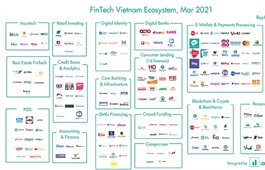Consumer finance: New vitality after 10-year journey
Consumer finance: New vitality after 10-year journey
Experts gathered yesterday (March 25) at VIR's headquarters for the consumer finance seminar themed “Consumer finance: New vitality after a 10-year journey”.

Consumer finance: New vitality after 10-year journey
|
Experts attending the consumer finance seminar held by VIR lauded the tremendous development the segment has made over the past 10 years, saying that consumer finance and consumer credit has come to play a crucial role in preventing black credit, helping people approach legal financial support, while simultaneously stimulating consumption as well as promoting manufacturing activities.
According to the experts, during the past 10 years, consumer finance has been playing an important role in building a comprehensive financial system in Vietnam.
Based on the assignment of the government and the prime minister, during the past time, the State Bank of Vietnam (SBV) implemented synchronous solutions to create favourable conditions for consumer credit to develop as well as contribute to protecting customers’ right.
Notably, these circulars are Circular No.43/2016/TT-NHNN dated December 30, 2016, regulating consumer lending by finance companies, Circular No.19/2016/TT-NHNN dated June 30, 2016, regulating the banking card operations, and Circular No.26/2017/TT-NHNN amending and supplementing a number of articles of Circular No.19/2016/TT-NHNN.
In addition, the SBV issued regulations for new products, models, services, and payment means associated with the Fourth Industrial Revolution such as digital banking, identification technology (such as e-Know Your Customer – eKYC), and regulations on opening individual payment accounts electronically. Furthermore, the SBV is researching and exploring the role blockchain can play in the payment field, applying big data and AI in a number of fields.
The SBV proposed the prime minister to allow the implementation of the controlled trial management mechanism for fintech activities, the decree replacing Decision No.20/2017 / QD-TTg on microfinance activities.
Le Trong Minh, editor-in-chief of VIR said, looking back on the year when the Vietnamese economy was affected by the COVID-19 pandemic, and over 10 years of development of consumer finance, along with the positive achievements, the number of consumer finance companies remained limited. These companies’ proportion of contributing to the outstanding loans in the economy is still low.
"The untapped market potential remains huge, not to mention that individual financial needs will continue to increase as the economy continues on a high-speed growth trajectory,” Minh said.
The consumer loan market is becoming more and more active with the emergence of many new investors, especially foreign ones. The market share of these companies increased from 1 per cent in 2011 to 16.3 per cent in 2020. By the end of 2020, there were 16 registered consumer finance companies with a total charter capital of about VND22 trillion ($956.5 million).
At the seminar, Dr Can Van Luc, a banking expert, offered several suggestions to develop a sustainable consumer finance market. Notably, state regulatory agencies should continue to improve the legal framework on managing financial companies; create conditions for small- and medium-sized financial companies to develop; increase competitiveness through attracting capital from foreign investors; and attract international preferential capital.
"Besides, it is necessary to develop technology platforms for consumer lending, reducing costs, increasing labour productivity, and coordinating to develop new business models in fintech, peer-to-peer lending, and mobile money. Finally, it is necessary to promote financial education for consumers and build a workforce for effective and sustainable development," Luc said.
Consumer lending was formally authorised in Vietnam in 1995, and has grown strongly in the last 10 years, promoting economic growth (including consumption, production, and services), increasing access to credit, reducing the rate of black credit, and limiting cash payments. Besides, there are still problems that need to be solved.
Consumer finance is part of consumer credit. The Vietnamese consumer finance market was born in the late 1990s when commercial banks began integrating such loans into their retail banking products. However, the market has only really begun to develop since 2007, when consumer finance companies joined the market.
























